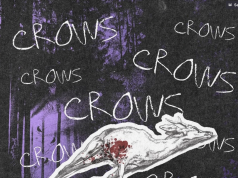The Daydream Club return with their seventh album All Our Born Days and like the world around them, there are clear signs of change.
The Daydream Club
Since their foundation in 2010, now husband and wife duo The Daydream Club have been slowly plotting their course to the top. While the definition of ‘top’ may have changed in that time, they remain firmly on course.
At the time of writing this review, their top 5 tracks on Spotify alone have amassed over 100,000,000 Spotify Streams (That’s without any playlist promotion). A staggering achievement for a self-released duo. Huge credit must go to Spotify for choosing to support great music in the absence of a major record label deal.
UK radio is failing independent artists like The Daydream Club
Despite their Spotify success, awareness of this band remains negligible. Does that matter? Maybe not, but it’s incredible to think how big The Daydream Club could be if this country’s radio station producers were as willing to take a punt on this self-released duo in the same way Spotify had!
Yes, they have received the obligatory radio spot plays from their local BBC Introducing stations, but really one play per release? BBC Introducing is playing at supporting new music and until this actually becomes a commitment to repeat plays and daytime playlisting it’s nothing more than a box-ticking exercise.
All Our Born Days
All Our Born Days draws upon the lifespan of the band to date. Lyrically Adam & Paula explore what they have witnessed and experienced, the good and the bad. Musically it’s a culmination of all of the duos sounds over the years coming together in one album, combining influences from alternative, ambient, electronic, folk, classical crossover, soul, dub and trip-hop.
As with all of The Daydream Club’s releases they have personally created every aspect of the album from writing, recording, producing, mixing and mastering to the artwork, photos and the animated music videos you see below. there’s no big team between audience and artist, just two people creating art.
The album begins with the most unlikely and most thrilling of tracks from The Daydream Club. ‘Rolling Out The Fire’ snarls and gnashes its teeth at the world and when Paula Pickering yelps at 2.03min we’re ready to take up arms and storm the streets. This track just builds and builds in the most glorious of ways.
Endgame arrives with a Radiohead-Esque guitar twang, quite a departure from their acoustic folk roots. The Daydream Club’s evolution has been so steady that it feels like this duo really can do anything it always sounds right.
‘You’ve Got It Wrong’ is The Daydream Club at their darkest, it feels like the soundtrack to accusation and betrayal. It tingles down your neck and makes your heckles rise. The lyric ‘Where do we go from here” hangs in the air like a heavy fog.
‘Honesty’ quickly emerges as the musical response to ‘You’ve Got It Wrong’ laying out a simple requirement for future progression. The message to the world is clear and powerful.
This is a serious, grown-up album tackling a broad range of themes from death, doubt, blame and despair. At times it feels like an open letter to the world we find ourselves now occupying. Despite the darkness, there are still plenty of moments of light, and the overwhelming feeling is one of optimism.
Track five ‘Camera’ provides a beautifully observed metaphor and feels like an inflexion point where the intensity and frustration of early tracks make way for a moment of quiet and beautiful reflection. Vocally this could well be Adam Pickering’s best moment.
‘Ocean & The Moon’ is probably the most familiar sounding of the tracks on the album fusing glorious memories of earlier work including Soundwaves of Gold and Saltwater. It might also be the point where you realise that despite the gloom out the window, happiness is really defined by the people closest to you.
‘Escapism’ shifts the tempo with spitting beats and twinkling electro sounds. It’s a wonderfully upbeat soundtrack to feeling free, a feeling I’m sure we can all relate to.
The last two tracks on the album are probably the most experimental, with links back to the bands previous Ambient Project. ‘From The Summit’ brings the album to a perfect conclusion providing some much-needed headspace and time for reflection.
Discover more from The Daydream Club
Words Mark Knight








